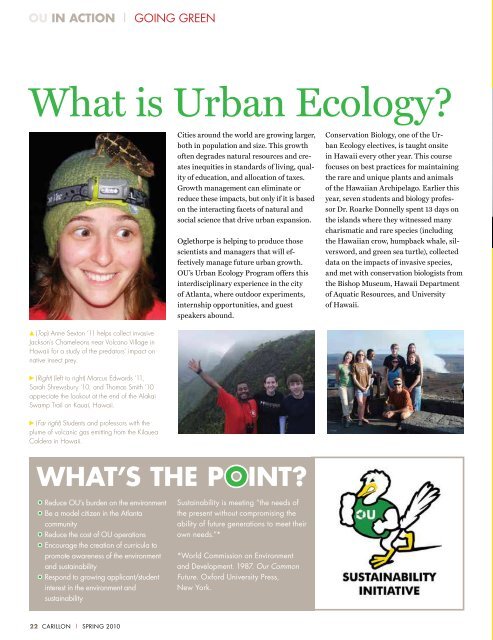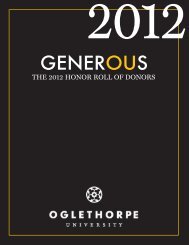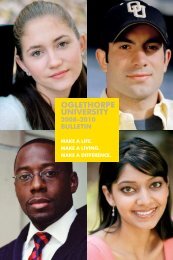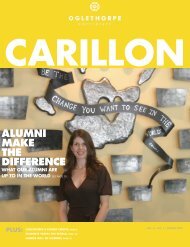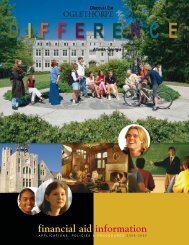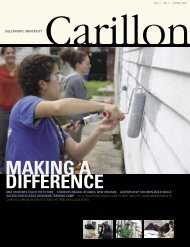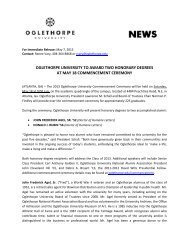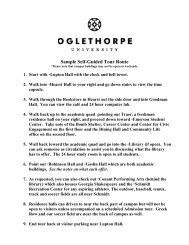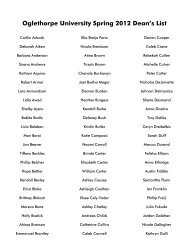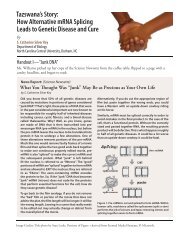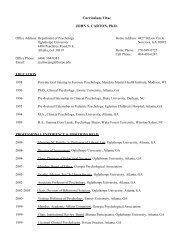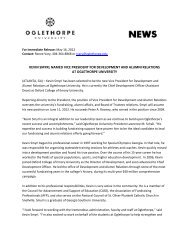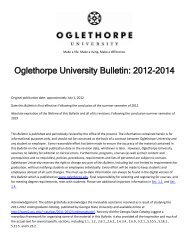Spring 2010 - Oglethorpe University
Spring 2010 - Oglethorpe University
Spring 2010 - Oglethorpe University
Create successful ePaper yourself
Turn your PDF publications into a flip-book with our unique Google optimized e-Paper software.
ou in action | Going Green<br />
going global | ou in action<br />
What is Urban Ecology?<br />
(Top) Anne Sexton ‘11 helps collect invasive<br />
Jackson’s Chameleons near Volcano Village in<br />
Hawaii for a study of the predators’ impact on<br />
native insect prey.<br />
(Right) (left to right) Marcus Edwards ‘11,<br />
Sarah Shrewsbury ‘10, and Thomas Smith ’10<br />
appreciate the lookout at the end of the Alakai<br />
Swamp Trail on Kauai, Hawaii.<br />
(Far right) Students and professors with the<br />
plume of volcanic gas emitting from the Kilauea<br />
Caldera in Hawaii.<br />
Cities around the world are growing larger,<br />
both in population and size. This growth<br />
often degrades natural resources and creates<br />
inequities in standards of living, quality<br />
of education, and allocation of taxes.<br />
Growth management can eliminate or<br />
reduce these impacts, but only if it is based<br />
on the interacting facets of natural and<br />
social science that drive urban expansion.<br />
<strong>Oglethorpe</strong> is helping to produce those<br />
scientists and managers that will effectively<br />
manage future urban growth.<br />
OU’s Urban Ecology Program offers this<br />
interdisciplinary experience in the city<br />
of Atlanta, where outdoor experiments,<br />
internship opportunities, and guest<br />
speakers abound.<br />
What’s the point?<br />
• Reduce OU’s burden on the environment<br />
• Be a model citizen in the Atlanta<br />
community<br />
• Reduce the cost of OU operations<br />
• Encourage the creation of curricula to<br />
promote awareness of the environment<br />
and sustainability<br />
• Respond to growing applicant/student<br />
interest in the environment and<br />
sustainability<br />
Sustainability is meeting “the needs of<br />
the present without compromising the<br />
ability of future generations to meet their<br />
own needs.”*<br />
*World Commission on Environment<br />
and Development. 1987. Our Common<br />
Future. Oxford <strong>University</strong> Press,<br />
New York.<br />
Conservation Biology, one of the Urban<br />
Ecology electives, is taught onsite<br />
in Hawaii every other year. This course<br />
focuses on best practices for maintaining<br />
the rare and unique plants and animals<br />
of the Hawaiian Archipelago. Earlier this<br />
year, seven students and biology professor<br />
Dr. Roarke Donnelly spent 13 days on<br />
the islands where they witnessed many<br />
charismatic and rare species (including<br />
the Hawaiian crow, humpback whale, silversword,<br />
and green sea turtle), collected<br />
data on the impacts of invasive species,<br />
and met with conservation biologists from<br />
the Bishop Museum, Hawaii Department<br />
of Aquatic Resources, and <strong>University</strong><br />
of Hawaii.<br />
“I learned about<br />
the inequality and<br />
poverty in South<br />
America and<br />
quickly decided<br />
that it was here<br />
that I wanted to<br />
try to help.”<br />
Alumni Profile:<br />
Matt Suggett ‘08<br />
recounts the <strong>2010</strong><br />
Chilean earthquake<br />
The Path to South America<br />
After I graduated from OU, I wanted to do something that made a difference before I<br />
returned to graduate school. I began looking for volunteer organizations abroad that<br />
would give me the opportunity to live in an exciting new culture and learn a new language<br />
while I volunteered. I learned about the inequality and poverty in South America,<br />
and quickly decided that it was here that I wanted to try to help.<br />
I found a small energetic organization called VE Global, which recruits, trains and organizes<br />
a global network of volunteers to achieve a vision of equality of educational and<br />
social opportunity for at-risk children in Chile. I applied to volunteer in an orphanage for<br />
5 months. I arrived in Santiago, Chile in March 2009 to begin volunteering, and for three<br />
months I worked in an orphanage every day. Those three months changed the way I look<br />
at the world, and gave me a new perspective on life. At that point I decided to defer my<br />
place at business school for one year, and began working for VE Global as Director of<br />
Resource Development.<br />
“Fuerza Chile”<br />
The days after the quake were surreal. The terror of the moment the quake struck was fresh<br />
in everyone’s mind, and strong aftershocks rattled the country at the rate of a few per hour.<br />
But, the thing that struck me most after the quake was the way people pulled together to<br />
support each other.<br />
In the weeks following the quake, we volunteered at the Red Cross warehouse in Santiago.<br />
People from all over Santiago, earthquake victims themselves, organized donation<br />
drives in their neighborhoods and churches, and delivered the goods to the Red Cross<br />
warehouse. Volunteers poured in every morning to help unload and sort donations,<br />
package them, and load the disaster relief onto convoys headed south to the epicenter.<br />
Suddenly, Chilean flags appeared in windows across the city. “Fuerza Chile” (“Be strong,<br />
Chile”) was spray painted on walls and buildings. It seemed that everyone was trying to help.<br />
Student groups collected donations and sent missions south to build shelters and distribute<br />
aid. We joined with a group of students from the <strong>University</strong> of Santiago and sent our<br />
volunteers south to help build shelters before the rainy season arrives. For many people in<br />
Chile, the earthquake was devastating: 2 million families lost their homes, and more than<br />
1,000 people lost their lives. Despite the devastation, the spirit and strength of the Chilean<br />
people has been impressive. As a society, they’ve come together to support each other,<br />
repair the damage, begin rebuilding, and move on.<br />
Matt continues his work in Santiago, Chile. Find out more about VE Global<br />
at www.ve-global.org.<br />
22 CARILLON | SPRING <strong>2010</strong> SPRING <strong>2010</strong> | CARILLON 23


